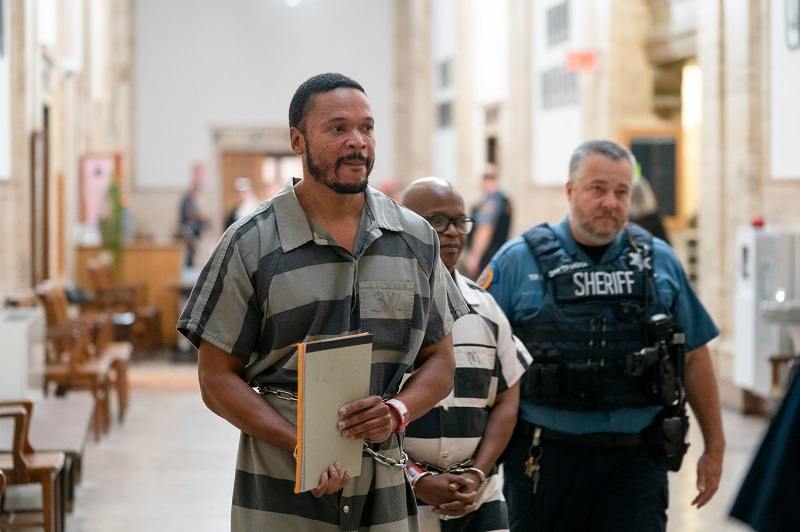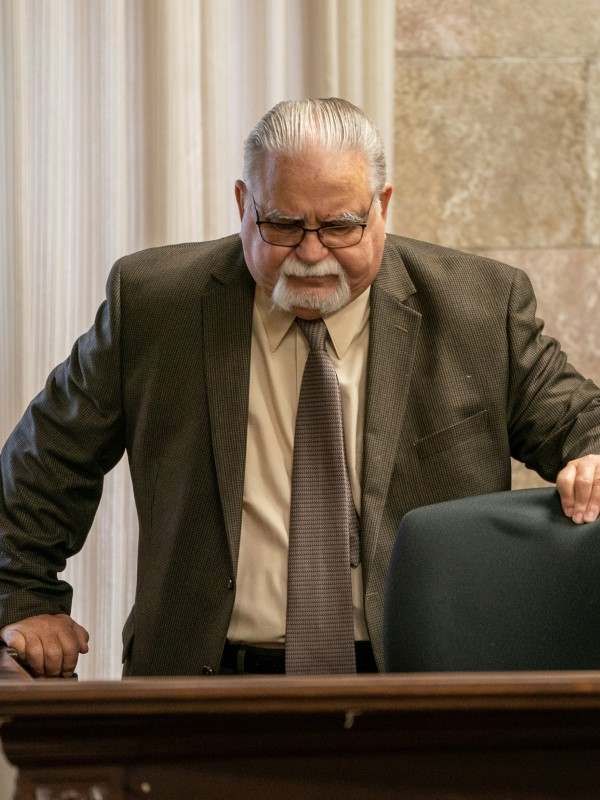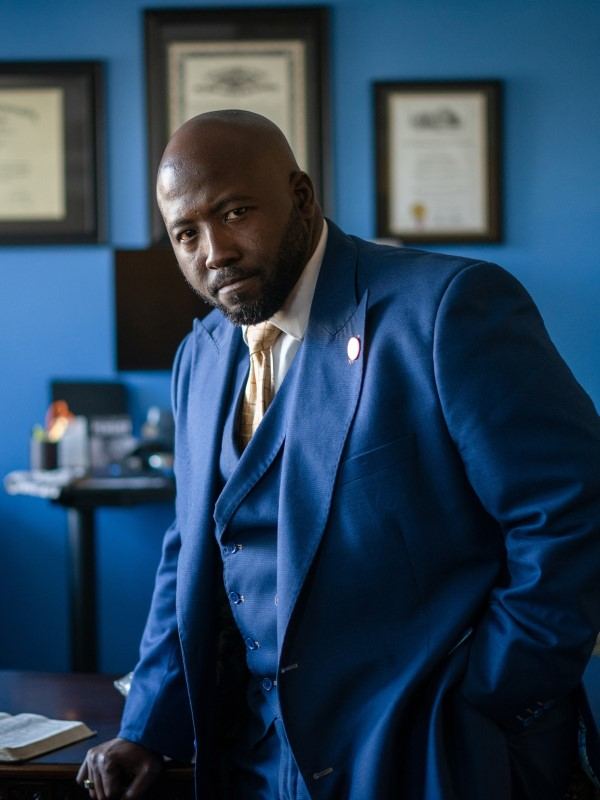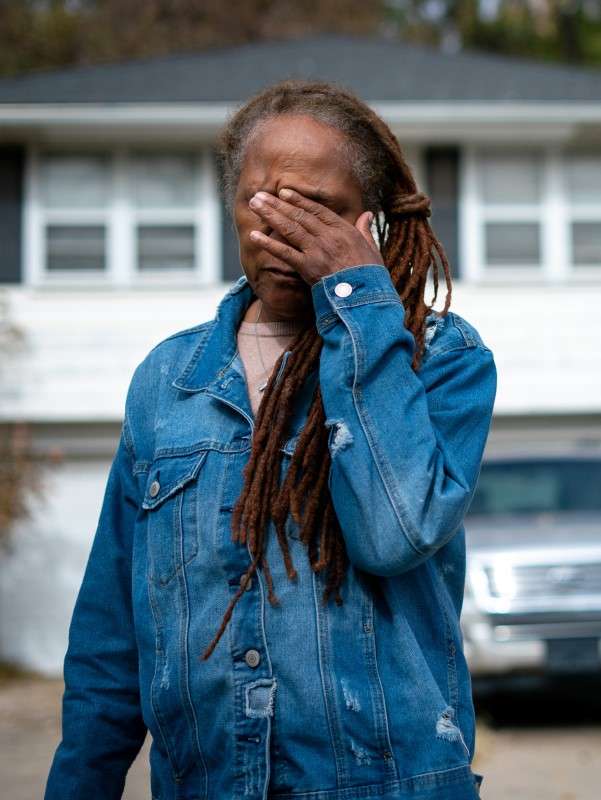
Brian Betts and Celester McKinney are led into the courtroom before their hearing at the Wyandotte County Courthouse in Kansas City, Kan., on Oct. 24, 2022.
13:04 JST, November 28, 2022
KANSAS CITY, Kan. – A dozen years after his retirement, Roger Golubski returned to the Wyandotte County Courthouse in late October to testify in a hearing for two Black prison inmates who claim the White former police detective framed them for murder long ago.
Golubski, 69, took the witness chair slowly. He was still burly, but his once-intimidating presence had been punctured by ailing health, including renal failure, diabetes and quintuple bypass surgery in April.
“Did you have a history of pressuring witnesses?” said Kevin Shepherd, a lawyer for Brian Betts and Celester McKinney. The two inmates, who were convicted in the 1997 case, sat next to Shepherd in striped prison jumpsuits.
“Never,” Golubski replied.

Retired Kansas City, Kan., police detective Roger Golubski arrives to testify at an evidentiary hearing related to Brian Betts and Celester McKinney at the Wyandotte County Courthouse on Oct. 24, 2022. Photo for The Washington Post by Christopher Smith
Golubski is the key figure in alleged corruption stemming from his 35 years in the Kansas City, Kansas Police Department that has raised troubling questions about justice and accountability at a time when many predominantly Black or Brown communities and other disenfranchised groups are vocally demanding both. He is accused of preying on impoverished Black residents by exploiting a network of female informants for sex and for coerced testimony, which he allegedly used to close cases; charges he has denied.
The tale that emerges from court testimony, documents and interviews reveals a world in which Golubski, at minimum, appears to have played a significantly influential role in dramatically determining what darkness happened in the lives of scores of Kansas City residents. It also provides a sense of the changes in power and justice occurring in the city, including the nuance, frustration and hope that has come as new leadership reckons with racial wounds.
In recent weeks, the U.S. Justice Department has taken steps to address some of the allegations, announcing two indictments of Golubski on eight counts, including civil rights violations, conspiracy and forcing women into involuntary servitude.
Advocates for alleged victims want accountability from local officials, as well. They are seeking an examination not just of Golubski’s actions, but of the police department and what they see as a local power structure that helped cover up what residents say happened.
Community leaders are demanding to know how Golubski was seemingly able to operate with impunity for decades and seeking reassurances that behavior such as his alleged misconduct could not happen again in the city’s 330-officer police force – now overseen by Kansas City’s first Black mayor, a former police officer who rose to the rank of deputy chief.
Golubski’s former police department partner, Terry Zeigler, who served as police chief from 2015 to 2019, denied knowledge of the alleged misconduct.
Nikki Richardson, who in 2020 founded an advocacy group called Wyandotte for Justice after the county that includes Kansas City, is among those who believe many people share responsibility for any abuse.
“The entire police department knew what he was doing,” Richardson said. “They love to point to Roger Golubski as this individual boogeyman. That’s what the police department wants – take care of him, problem solved. But it was an entire system.”
In 2017, Lamonte McIntyre, a Black man who spent 23 years in prison on a double murder conviction, was exonerated after his lawyers presented evidence that Golubski had set him up.
That case prompted federal authorities to launch a criminal investigation into his conduct on the force and, in September, the Justice Department charged Golubski, who retired as a police captain in 2010, with allegedly raping two Black women in the late 1990s and early 2000s. In November, a federal grand jury indicted Golubski on separate charges that he conspired with drug dealers and raped Black girls, ages 13-17, who were forced to work as prostitutes.
Golubski, who faces life in prison if convicted, has pleaded not guilty to the federal charges. In an email, his attorney, Christopher Joseph, said Golubski “looks forward to clearing his name from these decades-old and uncorroborated allegations.” Joseph did not respond to other requests for comment for this story.
U.S. Magistrate Judge Rachel E. Schwartz, citing Golubski’s need for regular medical treatment, released him to house arrest pending trial.
Police Chief Karl Oakman, who was hired in 2021, said in an interview that his department is assisting federal authorities in their criminal investigation. He disputed the notion that there is a broader cultural problem in the police force.
“I think it’s a personal accountability issue that I hope he’s gonna have to deal with for his actions,” Oakman said. “Do we have, in 2022 or 2021, a pattern of people doing this? Do we have a pattern in 2020, 2019, 2018, 2017? You won’t find it.”

Wyandotte County District Attorney Mark A. Dupree Sr., shown on Oct. 25, 2022, is Kansas’s first Black district attorney.
One key question is how far city leaders are willing to look in examining accusations that stretch back decades. Authorities face the daunting prospect of reviewing dozens of convictions, opening unsolved murder cases, and sorting through mounting allegations of abuse.
In a lawsuit against the county government this year, McIntyre’s legal team included the initials of 73 women they said Golubski victimized, based on interviews and other evidence they said they collected. The Midwest Innocence Project is weighing requests for legal help from 40 inmates in Wyandotte County, many whose cases are tied to Golubski, said the group’s executive director, Tricia Rojo Bushnell.
Last week, Wyandotte County District Attorney Mark A. Dupree Sr. (D) announced a $1.7 million plan to review 150 of Golubski’s cases, a process he said could take up to 18 months.
“The scale of this is mind-boggling,” said Cheryl Pilate, McIntyre’s lawyer, who has worked on the case since 2009. “Every time I think I have my arms around this, it gets bigger and more distressing. They can’t sweep this under the rug. There are gaping wounds out there.”
***
With a population of 155,000, Kansas City, Kan., is far smaller and, residents say, more insular than its more than 500,000-person namesake a few miles east on the other side of the Missouri River. The municipal building, county courthouse and police department headquarters are clustered in a downtown strip that includes a Native American-run casino and a handful of Latin American restaurants.
As a detective, Golubski worked cases in low-income, majority-Black neighborhoods in the northeast, cultivating a network of female informants.
His accusers say he targeted the city’s most vulnerable – drug addicts, prostitutes and the homeless. Prosecutors said Golubski protected a local drug dealer, Cecil A. Brooks, who has served 13 years of an 18-year federal prison sentence for cocaine trafficking, in exchange for money and sex with underage girls. Brooks and two other men were also charged in the November indictment.

Ophelia Williams stands in front of her former home in Kansas City, Kan., on Oct. 25, 2022. Williams alleges that then-police detective Roger Golubski sexually assaulted her multiple times starting in 1999. Photo for The Washington Post by Christopher Smith
Ophelia Williams, 60, who said she is one of the two women identified by their initials in the federal indictment in September, once lived in this area of town. On a recent afternoon, she returned to her old residence, a white-paneled, split-level house on a quiet, tree-lined block.
“That’s where he raped me,” said Williams, who has four children and nine grandchildren.
She recounted the night in August 1999 when police arrested her twin sons, then 14, on charges that they had stolen a gun and fatally shot an elderly couple while stealing items from their house.
At that moment, Williams didn’t yet know the name of the White detective who complimented her legs and her nightgown. The detective, who she eventually found out was Golubski, returned a few days later, offering to help her sons avoid punishment. When she let him in, she says, he assaulted her.
Federal prosecutors allege that Golubski raped Williams several times over the next few years, including in his police vehicle. When she threatened to report him, he implied he would harm her and “she would never be found,” according to federal prosecutors. He never helped her sons, Ronnell and Donnell, who pleaded guilty and remain in jail.
Williams speaks in a hoarse whisper, the consequence of a massive heart attack in 2017. But her voice carries loudly. Having told her story in a private deposition in the McIntyre case, Williams went public in June, speaking out at a rally organized by the activist group More2 outside the federal courthouse.
Williams has accused Zeigler, Golubski’s former partner, of being outside her house in their police vehicle on one occasion when Golubski assaulted her.
In a phone interview, Zeigler adamantly denied the accusation, saying he investigated the case involving her sons with a different detective because Golubski was an acting captain at the time.
“I didn’t take Roger by her house,” said Zeigler, who has not been criminally charged.
The other woman in the September indictment, identified only by her initials S.K., has not spoken publicly. McIntyre’s lawyer said the woman remains frightened of Golubski.
S.K. was in middle school when Golubski contacted her in the late 1990s to falsely claim she was a witness in a case, prosecutors said. Once she agreed to meet him, Golubski threatened to harm her grandmother. Then, he sexually assaulted the girl, according to federal prosecutors.
Golubski raped S.K. at least 10 times over three years, according to prosecutors. On one occasion, he took her to a cemetery and “instructed her to find an area to dig her own grave.” On another, he forced her to crawl along a riverbank on a dog leash, prosecutors said.
“This has taken such a toll on her life,” Lora McDonald, executive director of More2, said of S.K., now in her late 30s. “She was a middle school girl when this happened. She has no understanding of what lawfulness looks like, what legitimacy looks like.”
In the interview, Zeigler said Golubski operated largely on his own in developing contacts in the community and did not share information about his informants over concerns that doing so could compromise their safety. Their superiors did not demand to know where Golubski got his tips, Zeigler said, because keeping tabs on all of the police department’s informants would be nearly impossible.
“The more that mounts up, you just shake your head,” Zeigler, who testified to the federal grand jury that indicted Golubski, said in the phone interview. “If it turns out to be true, a lot of people, including me, will be feeling pretty stupid and saying, ‘Okay, why didn’t I see this, or should I have seen this?'”
***
A step toward legitimacy for Golubski’s alleged victims came in 2017 when Dupree, the Wyandotte County district attorney, agreed to reopen McIntyre’s case.
McIntyre was 17 when he was arrested and charged in the killings of Doniel Quinn and Donald Ewing in April 1994.
His lawyers contend that Golubski, who investigated the case, may have targeted McIntyre because his mother, Rose, had refused the detective’s sexual demands. The teenager was arrested just six hours after the killings on the basis of 191/2 minutes of taped interviews, according to his lawyers.
Prosecutors presented no search warrants, offered no forensic evidence and did not recover the murder weapon, according to testimony in the case.
McIntyre, in a phone interview, recalled being transported, in handcuffs, to Dupree’s office for a meeting. “I’m not here to beg for my life,” McIntyre said he told him. “Just look at evidence that is presented to you. Judge me on the evidence.”
Dupree, Kansas’s first Black district attorney, grew up locally with parents who were pastors, and he quotes scripture from Micah 6:8 as a guiding principle: “To do justice and have mercy.”
He conducted his own investigation and the blowback was intense. Zeigler and other police officials “didn’t like the fact that I was looking at cases they investigated,” Dupree said. “I remember calling my wife and having her pray with me. To do justice, I have to tick some folks off.”
McIntyre was scheduled for a six-day hearing to determine whether he would be granted a new trial. Two days in, the district attorney declared a “manifest injustice” had occurred in McIntyre’s trial 23 years earlier. Dupree asked the court to vacate his convictions and drop all charges, saying the new evidence would have created reasonable doubt about his guilt.
Five years later, Ziegler, the former police chief who had been Golubski’s partner, said he still objected to Dupree’s decision not to retry McIntyre and let a new jury consider the totality of the evidence. He accused the district attorney of acting to fulfill a political agenda in a case that received considerable media attention.
“The whole hearing was about Golubski, but where are the facts when you’re talking about the homicide? They didn’t get into it,” Zeigler said. “Mark says it was a great injustice what happened to McIntyre. What he did was a great injustice.”
After the exoneration, Dupree announced plans to launch a “conviction integrity unit,” joining a growing number of jurisdictions that have moved to reopen cases. The number of exonerations in the United States has risen steadily in recent years, already reaching a record high of 217 this year, according to the National Registry of Exonerations.
Dupree also raised concerns about Golubski with Stephen R. McAllister, who at the time was the chief federal prosecutor in Kansas. In 2019, McAllister asked the FBI to open a criminal investigation.
Golubski “was notorious in the community,” McAllister said in the interview. “When I met early on with agents and they talked about interviews and people they had encountered, the stories were atrocious.”
McIntyre won a certificate of innocence from the state of Kansas, which awarded him $1.5 million in 2020. He struggled to adjust to his new life and, in 2019, moved to Phoenix, where he took up meditation. He breeds exotic dogs and founded the nonprofit Miracle of Innocence to advocate for the wrongly incarcerated.
Last spring, McIntyre and his mother won a $12.5 million civil settlement from the Wyandotte County government. He said he won’t consider justice served until Golubski is behind bars and the state reviews all of the cases he was involved in.
“Had no one investigated my case, I would still be in prison,” McIntyre said. “Every case that came through that time should be looked at.”
***
Zeigler retired as chief in the fall of 2019. County officials replaced him last year with Oakman, who served 29 years in the Kansas City, Mo., police department.
A few months later, Tyrone Garner (D), a former deputy police chief under Zeigler, was elected as the city’s first Black mayor.
The historic leadership change offered renewed hope for community activists who had garnered national attention in demanding that the Justice Department open a broader civil investigation in to the police department’s policies, training and discipline. Team Roc, entertainment mogul Jay-Z’s social justice group, has amplified their demands and sent its own investigators to Kansas City to gather evidence, said managing director Dania Diaz.
Garner, the mayor, and Oakman, the police chief, have resisted a federal investigation of the Kansas City police, which Oakman said would be costly and serve as a distraction as he pursues changes in the department.
Since taking over, Oakman arranged for FBI officials to train supervisors and commanders on “color of law” violations that deprive suspects of their civil rights. He asked an outside jurisdiction – his former department in Missouri – to review officer-involved shootings and established a cold case unit to reopen unsolved murders. And he has sought to improve public relations, organizing a community peace walk and rebranding police vehicles with a refreshed color scheme and logo.
“When I go out to talk with the community, I say, ‘This is not your grandfather’s police department,'” said Oakman, who grew up in Kansas City, Kan.
He suggested that Golubski’s alleged misconduct was a relic of a bygone era. Police officials said nine current officers were on staff in 1994, the year McIntyre was charged, and 58 officers remain from the early 2000s, during the period Golubski is accused of assaulting Williams and S.K.
“I’ve done a top-to-bottom review of this current police department. The stuff with Golubski and some others, I don’t see that,” Oakman said.
Garner, who served in the police department’s internal affairs division, said he knew nothing of Golubski’s alleged misconduct. He has distanced himself from Zeigler, with whom he says he clashed after publicly supporting Dupree’s efforts to review questionable convictions.
Garner said in an interview that the Justice Department’s criminal probe of Golubski should be completed, and its findings made public, before officials determine whether an investigation of the police department is warranted. He took umbrage at criticism from activists, saying he, Oakman and Dupree have been supportive of efforts to hold Golubski accountable.
“You’ve got three African American males sitting here that are saying, ‘We are going to make sure that we get to the bottom of the allegations, and we’re going to help [the Justice Department],'” Garner said. “But to hold us to a higher standard, to me, is somewhat unfair.”
Oakman has pledged support for Dupree’s plan to review Golubski’s cases, but activists remain skeptical that police officials will be willing to hold themselves accountable. The effort represents a massive undertaking whose challenges were illustrated on the recent day when Golubski testified in the Betts-McKinney hearing.
The two men were sent to prison in 1997 for the killing of Gregory Miller during a botched drug deal. Their attorneys say Golubski, who had been married to Miller’s aunt, arranged to be transferred onto the case and coerced incriminating testimony from the men’s uncle, who later recanted.
On the witness stand in October, Golubski matter-of-factly denied any involvement. “It wasn’t my case,” he said.
Two dozen community activists watched from the courtroom gallery.
Dupree’s office is standing by the conviction, and his prosecutors argued that Betts and McKinney should remain in prison. Judge Gunnar A. Sundby has not ruled in the case.
“Not every case is a McIntyre case,” Dupree said. “There are cases that maybe raise an eyebrow, but according to the law, the evidence is not there to substantiate anything further.”
Completing his testimony, Golubski conferred with his attorney and walked out of the courthouse by himself.
Betts and McKinney, in handcuffs and leg irons, were escorted back to the county jail.
Top Articles in News Services
-

Survey Shows False Election Info Perceived as True
-

Prudential Life Expected to Face Inspection over Fraud
-

Hong Kong Ex-Publisher Jimmy Lai’s Sentence Raises International Outcry as China Defends It
-

Japan’s Nikkei Stock Average Touches 58,000 as Yen, Jgbs Rally on Election Fallout (UPDATE 1)
-

Japan’s Nikkei Stock Average Falls as US-Iran Tensions Unsettle Investors (UPDATE 1)
JN ACCESS RANKING
-

Japan PM Takaichi’s Cabinet Resigns en Masse
-

Japan Institute to Use Domestic Commercial Optical Lattice Clock to Set Japan Standard Time
-

Israeli Ambassador to Japan Speaks about Japan’s Role in the Reconstruction of Gaza
-

Man Infected with Measles Reportedly Dined at Restaurant in Tokyo Station
-

Videos Plagiarized, Reposted with False Subtitles Claiming ‘Ryukyu Belongs to China’; Anti-China False Information Also Posted in Japan
























